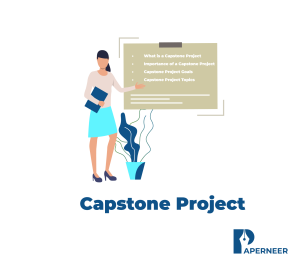Capstone Project – A Complete Guide A capstone project is sometimes the...
Read MoreUnderstanding Persuasive Essay Writing

The ability to put forth sound and compelling arguments is an important skill in everyday life. You can use arguments to make a point in a class discussion, persuade a friend to lend you money or talk to your employer about a day off. Becoming skilled in clear, logical reasoning can also help you through faulty arguments and in refuting them. Understanding persuasive essay writing can help you learn to put forth your thoughts logically. Therefore, this blog brings you all the essentials to understanding persuasive essay writing.
Defining Persuasive Essay
A persuasive essay is a type of academic writing that aims to persuade or convince the readers with the author’s stance on a topic. The author has to present logical and researched ideas and arguments to sway readers in any way.
For a persuasive essay, the author has to find a controversial point, a point that at least some of your readers will not be inclined to read, to advance an argument. Because argument assumes controversy, you have to work really hard to convince readers of the validity of your position.
Why is Reasoning Important in a Persuasive Essay
In understanding persuasive essay writing, it is important to know the value of logical reasoning. When you write a persuasive essay, your main purpose is to convince readers that your particular view or opinion on a controversial issue is correct. In addition, at times, you may have a second purpose for your essay, i.e. to persuade your readers to take some sort of action. Therefore, it is crucial to provide them with a clear main point and plenty of logical evidence to back it up.
Let’s say, for instance, you want to argue that public schools should require students to wear uniforms. In this case, you might do research to gather as much evidence as possible to support your argument. You may check to see if uniforms are more budget-friendly than other alternatives, or you could research if the schools with uniforms have a lower rate of violence than those without uniforms. Even you can see if students’ academic performance improves when school uniforms are adopted. While searching for the evidence, make sure that all your details link to your topic and support the main point that you want your audience to agree with.
Persuasive Essay Outline
Before crafting an outline for your persuasive essay, you should have an idea about how we can develop a scratch of our persuasive essay through prewriting. Before anything, choose a topic and ask yourself what controversial subject you are well-qualified to argue about. Select something you really care about and want your readers to think about it.
After finalizing your topic, start developing your persuasive essay through prewriting techniques like freewriting, subject tree, listing, and clustering. Including that, outlining your essay is also one of the prewriting techniques, we will discuss it separately in this section as it serves as the most important technique.
- Freewriting is a technique in which you write quickly about a topic without pausing or checking for corrections to gauge your knowledge.
- In the subject tree, the related ideas of the topic connect outwards the main topic, in a tree shape. To understand it better, check the Illustration 1.
- Listing the ideas and rubrics in a line below the key topic.
- The main topic is kept in the middle and all the other linked ideas are associated with the main topic in a circular or cluster form. You can get help from Illustration 2 to create a cluster diagram for your own essay.
This essay follows a similar outline to those we’ve covered in our previous articles, including the process analysis essay, Cause and effect essay, classification essay, narrative essay, comparative essay and definition essay.
Intro Paragraph:
The introductory paragraph provides a roadmap for developing the debate. It may consist of anecdotes and captivating quotations that can grab the audience’s attention. In addition, it will have the thesis statement in it that the author crafts for the essay.
Body:
This part of the essay consists of several paragraphs and is the most detailed part of essay. The body will address all the supporting details in well-structured fully developed paragraphs. Each of the body paragraphs should consist of a topic sentence, mostly at the beginning of the paragraphs, that introduces which unique aspect of the topic is going to be discussed in that paragraph.
Counterargument:
In the persuasive essay, this part is an addition and has to present the opposing viewpoints to provide a common ground for discussion over the topic.
Conclusion:
This part sums up the whole essay. In the conclusion paragraph, the thesis statement is restated in different wordings than in the introduction. It should furthermore tell the readers about the importance of the topic under discussion.
Persuasive Essay Thesis Statement
Writing the thesis statement in essays is like building a bridge. The way strong pillars are needed for the support of the bridge, key points of the essay in the thesis would play the same role of supporting the whole essay to function effectively. The thesis statement will always have two components, i.e. a claim and supporting details. In writing a persuasive essay, the author makes a claim or starts an argument and then develops ideas to support his argument.
Generally, a claim can be an assertion or a stance and is debatable while supporting details will reinforce the claim. Organizing your supporting details while structuring your thesis statement and combining the claim with supporting details are some key points to consider while writing the thesis statement.
Example of a Persuasive Essay
After understanding what a persuasive essay is and how it works, it is time to get you through a written example of a persuasive essay. The underlying example is for supporting the stance of practical learning or studies that can assist a college student or anyone related to academia.
A Five-Paragraph Persuasive Essay Example
Introduction
In today’s world, education plays a vital role in shaping an individual’s career and preparing them for their professional life. However, the main debate these days is whether the practical knowledge of the field helps one grow better professionally or it is theoretical knowledge that helps in one’s professional growth. Theoretical studies have always been regarded as the foundation of knowledge. However, practical studies are increasingly recognized as necessary for real-world application. Practical studies help in hands-on learning and skill development which are more effective ways to grasp difficult topics and prepare students for the professional world.
The emphasis on hands-on learning is especially significant because it helps students to apply their knowledge in a practical field, bridging the gap between theory and reality and developing problem-solving abilities.
Body
The most important aspect of practical studies is that it allows students to apply their theoretical knowledge in real-world situations. While theoretical learning provides a basic understanding of the principles and concepts of the subject matter, its context is often lacking. Practical studies, on the other hand, allow students to put these principles to the test in real-world situations, leading to a deeper and more relevant understanding of the subject. For example, in professions such as engineering or medicine, understanding theoretical concepts without practical application would prevent students from performing procedures or designing functional systems.
This experiential learning allows students to understand the meaning and impact of their studies.
Secondly, practical studies fill the gap between theory and practice, making education more relevant for today’s workforce. Nowadays, employers want to hire the ones who not only understand the theory behind their work but the ones who can also implement it effectively. Practical studies help students prepare for the challenges of their work by offering them the skills and experience they need to move flexibly to their professional roles. For example, internships and laboratory works offer exposure to industrial techniques, so that students are well prepared to overcome the obstacles that can encounter then in their chosen disciplines.
In addition, practical studies can help improve problems and critical thinking. Students in practical environments often encounter with real world problems that require imaginative responses. Unlike theoretical learning, which generally has predetermined answers, practical studies urge students to think in an imaginative way and adapt to unexpected situations. These experiments and practical implementation of the theories not only prepare them for the unpredictable nature of professional life, but also promotes resilience and rapid thought. These talents are useful in a variety of fields, including business and science.
Conclusion
In summary, while theoretical studies are important for providing fundamental knowledge, practical studies are required for applying that knowledge in the real world. Practical education better prepares students for their future jobs by enabling them to deal with real-world situations, bridging the gap between theory and practice, developing critical thinking skills, and encouraging active learning. In today’s fast-paced and ever-changing work environment, practical studies are invaluable.
Unique Persuasive Essay Topics
For understanding persuasive essay writing, you can make use of the following topics to practice your essays:
Funny Persuasive Essay Ideas and Topics
- Ice cream should be listed as a healthy food
- Eating dessert before dinner should be a new norm
- Napping should be a mandatory work break
- Workplaces should switch from five working days to four days
- Schools should adopt time travel as a subject
Persuasive Essay Topics for College
- Incorporating financial literacy into the college curriculum
- Diversity in college campus
- Attendance policy should be flexible in college
- The benefits of community services and volunteerism for college students
- College curriculum should include more practical skills courses
If you’re only interested in reviewing the bullet points for a persuasive essay, you can check them out here.
Say goodbye to Mistakes in Term Papers
Avoid Errors in Term Papers Writing a theme may be a vital tutorial task that needs careful designing and...
Read MoreUnraveling the Stories: Autobiography vs Biography
Autobiography vs Biography Understanding the excellence between autobiography and biography is crucial for...
Read More



